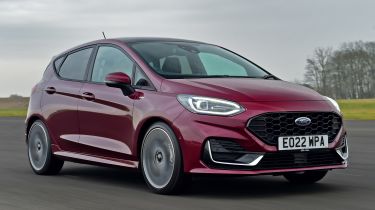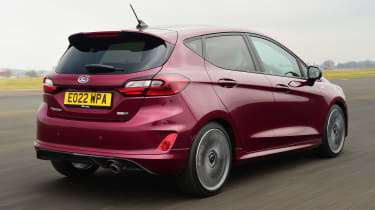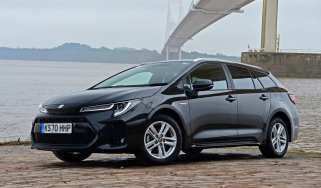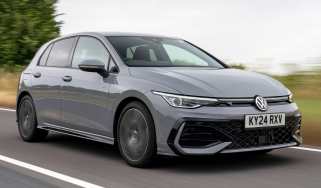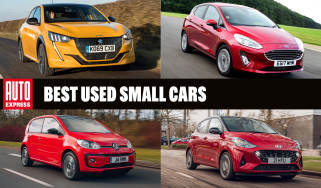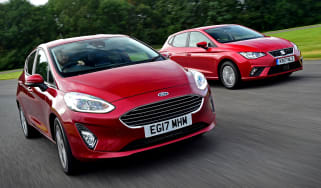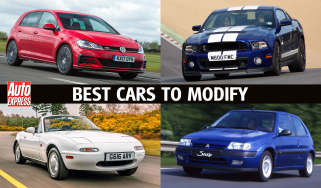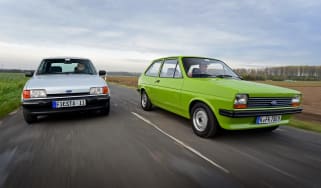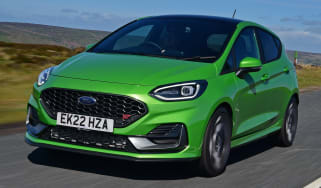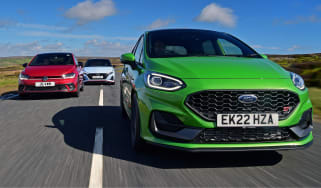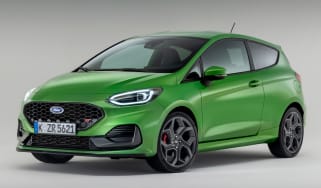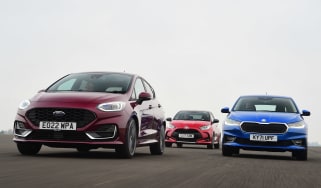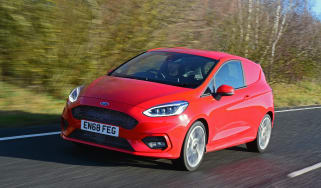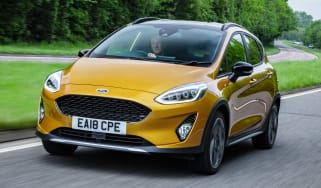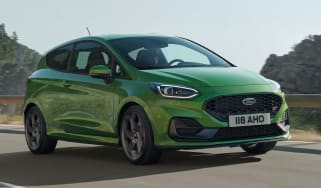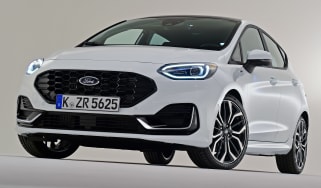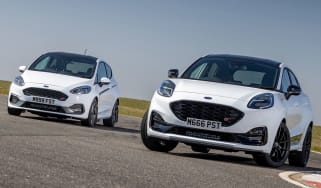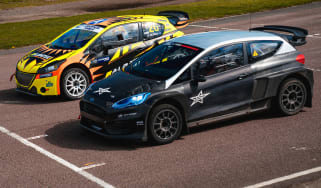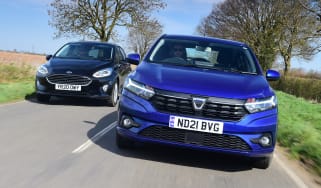Ford Fiesta (2017-2023) review
The last-ever Ford Fiesta supermini is good fun and remains a solid buy despite increasingly strong competition

The Ford Fiesta is a British motoring icon, and the latest model is one of the best 'real-world' cars around, because it ticks all of the rational boxes, but also manages to be great fun to drive.
Offering plenty of comfort, refinement and practicality, the Fiesta comes with plenty of standard kit, while the agile handling means it can easily put a smile on your face on the most mundane of journeys. With improvements made to cabin quality, infotainment and space, the current Ford Fiesta is the best it’s ever been.
About the Ford Fiesta
The latest generation of the Ford Fiesta was launched in 2017, and in many ways it was the arrival of this model which probably spurred the supermini market into action; the last one was so good, how could Ford go wrong with the follow-up?
As a result, brand-new versions of the SEAT Ibiza, Volkswagen Polo, Citroen C3, Kia Rio and Suzuki Swift arrived, updates were made to the Hyundai i20, Mazda 2 and Renault Clio, while big incentives were placed on models like the Vauxhall Corsa, Skoda Fabia and Peugeot 208 to help them stay attractive to buyers. It all means that buyers looking for a supermini have never had so much choice.
More reviews
Car group tests
- Ford Fiesta vs SEAT Ibiza: a used budget supermini dance-off
- Complete Ford Fiesta review: every generation tested as production ends
- Ford Fiesta ST vs Volkswagen Polo GTI vs Hyundai i20 N: 2022 group test review
- Ford Fiesta vs Skoda Fabia vs Toyota Yaris: 2022 group test review
In-depth reviews
Road tests
Used car tests
That's especially true of the Fiesta range itself. Ford has realigned the Fiesta model line-up to ensure there’s something to suit everyone. There’s eight models on offer, from the entry-level Trend through to the sportier ST-Line versions, and the hardcore ST to consider for those possibly thinking of the odd track day experience.
There is, though, the inevitable downside, and with prices starting at more than £19,000 it’s not as affordable as it once was. If you want to specify additional luxury kit you’ll certainly pay for it: around £24,000 is needed to bag a 99bhp model in ST-Line X trim, while Ford wants around £27,000 for the racy ST-3 model.
A facelift in 2022 brought in some styling tweaks, with Ford introducing its new family face which will feature on all upcoming models. There's a larger, more angular grille, with the blue oval badge now sitting within it, rather than at the top. The bonnet has also been redesigned, the nose of the car raised and new LED headlights fitted.
The sportier ST-Line models add a more aggressive front bumper, with a gloss black honeycomb mesh grille, and the higher-riding Fiesta Active now features vertical grille bars, plastic body cladding and silver accents at the front. New wheel designs are available across the range and updated on-board tech and extra safety kit is included, too. However, Ford has taken the decision to only offer a downgraded version of its Sync infotainment system for the Fiesta (prior to production ceasing in mid-2023), which means all models feature Sync 2.5 instead of the 3 version.
The Fiesta is now offered as a five-door model only, with the three-door variant no longer available on the price list. In terms of engines, there are three petrols available. The 1.1 Ti-VCT is the base unit, and delivers 74bhp. The 1.0 EcoBoost three-cylinder turbo petrol is the staple of the range, and it comes in 99bhp and 123bhp versions (the 153bhp model has been discontinued), with the more powerful engine using mild-hybrid technology to help improve fuel economy and CO2 emissions.
The sporty ST-3 uses a punchy 1.5T EcoBoost engine with 197bhp, while the frugal 1.5 TDCi oil burner was removed from the Fiesta range in 2020.
All cars use a six-speed manual transmission (with the exception of the 1.1L Ti-VCT five-speed manual), while the 123bhp petrol version is offered with the option of a seven-speed DCT auto 'box.
The Fiesta range also includes the Fiesta Active with its raised ride height and off-road styling for people who want an SUV, but like the compact dimensions of a supermini.
Used and nearly new
The Ford Fiesta was first launched back in 1976 and, 40 years later, it’s more popular than ever. It’s been through eight generations over the years, but each one has been a huge success with the Blue Oval baby regularly topping the UK new car sales charts.
One of the first Ford models to get front-wheel drive, the Fiesta has always aimed to deliver practicality and low running costs above all else. The very early cars are now considered classics, while latest models represent one of the best small car used buys thanks to their upmarket appearance and sparkling driving dynamics.
Ford Fiesta history
Ford Fiesta Mk7: 2017-2023
The latest Ford Fiesta is one of the best yet, combining its predecessor's style and driving sparkle with an upmarket interior that’s packed with kit. It’s also a fraction roomier inside, while as before there’s a choice of rakish three-door and versatile five-door layouts. The high performance ST tops the range, but there are also luxurious Vignale and tough-looking Active models. Most versions also get the firm’s excellent SYNC3 infotainment system. Read our full Ford Fiesta Mk8 buyer’s guide here.
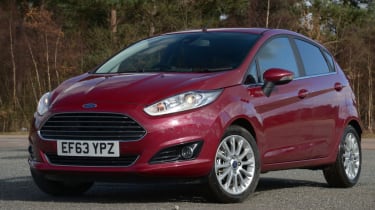
Ford Fiesta Mk6: 2008-2017
Combining head-turning looks with brilliant driving dynamics, the Mk7 Fiesta is a truly desirable small car. There’s a choice of three and five-door bodystyles, with both providing decent space and versatility. You’re also spoiled when it comes to engines, with a wide array of efficient petrol and diesels, plus there’s the fiery ST hot hatch. All cars are well equipped, but Bluetooth was an option on early cars, so double check if it's fitted. Read our full Ford Fiesta Mk7 buyer’s guide here.
Ford Fiesta Mk5: 2002-2008
The first genuinely all-new Fiesta since 1989, the Mk6 was heavily influenced by the brand’s trademark late Nineties ‘New Edge Design’. With square-edged styling and upright stance it looked more mini-MPV than supermini. More grown-up to drive than previous versions, it had a quality look and feel that rivalled models such as the VW Polo. It’s still a practical and reliable used car option, with bargain basement prices making it a great choice for those looking to buy a small car on a shoestring budget. You can read our full Ford Fiesta Mk6 buyer’s guide here.
Older Ford Fiesta models
Making its debut back in 1978, the original Fiesta was Ford’s first mainstream model to combine front-wheel drive and a hatchback. It was also one of the first to jump on the junior hot hatch bandwagon with the XR2. It’s now considered a classic, but many have rusted away to nothing.
Essentially a heavy facelift of the first-generation car, the Mk2 debuted in 1984 with a more rounded look. It also featured a less utilitarian interior and the option of a diesel for the first time.
When the Mk3 arrived in 1989 it became the first Fiesta to get a five-door option, while it also featured big car features such as optional ABS brakes. Wild RS Turbo model packed 130bhp and was identified by its green bumper inserts.
In 1995 a heavily revised Mk4 appeared and used all of Ford’s chassis-tuning know-how from the first Mondeo to deliver class-leading ride and handling. It was also the first to get the brilliantly smooth and responsive 16 valve Zetec SE petrol engines that continued to be used right through to the Mk6. However, it’s ‘fish face’ styling wasn’t to all tastes.
For an alternative review of the Ford Fiesta, visit our sister site carbuyer.co.uk...
